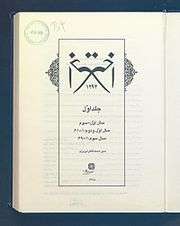Akhtar (magazine)
The Persian periodical Akhtar (Persian: اختر, meaning Star in English) was founded in 1876, following the suggestion of the Persian ambassador in Constantinople (now Istanbul) at that time, and was published until its discontinuation in 1896. Editor and director was Agha Mohammed Taher Tabrizi, the editor in chief Mirza Mehdi Tabrizi (1839-1907) was the founder of the Khorshid Publishing House in Constantinople and later the editor of Hekmat (1892-1912) in Cairo. Mirza Mohammad Ali Khan Kashani, who founded the periodical Sorayya (1898-1904) later published in Cairo, also briefly worked for the journal.
 | |
| Editor | Mīrzā Mehdī Ṭābrīzī |
|---|---|
| Categories | Politics |
| Publisher | Āqā Moḥammad Ṭābrīzī |
| First issue | 3 January 1876 |
| Final issue | 7 September 1896 |
| Country | Ottoman Empire |
| Based in | Constantinople (Istanbul) |
| Language | Persian |
| Website | Akhtar |
At the beginning, Akhtar - the first non-official press medium - was published almost daily, later twice - and eventually once a week. The distribution of this journal extended from many cities of Iran and the Ottoman Empire to the Caucasus and South East Asia.[1] It served as a mouthpiece for Iranians in diaspora and was used by the Persian embassy and the consulate in Constantinople as a newsletter. Alongside political daily reports it contained domestic and international news, articles on scientific and literary topics as well as reports from correspondents and letters from Persia (now known in English as Iran). Even though Akhtar as a journal published in exile could report more freely, the Ottoman censors suspended it several times. After the assassination of Naser ad-Din Shah in 1896, the Ottoman government permanently banned the journal.[2]
See also
- Iran-Turkey relations
References
- cf. Pistor-Hatam, Anja: Nachrichtenblatt, Informationsbörse und Diskussionsforum: Aḫtar-e Estānbūl (1876-1896) – Anstöße zur frühen persischen Moderne, Münster 1999.
- cf. Pistor-Hatam, Anja: Iran und die Reformbewegung im Osmanischen Reich. Persische Staatsmänner, Reisende und Oppositionelle unter dem Einfluss der Tanẓīmāt, Berlin 1992.
Further reading
- Pistor-Hatam, Anja: Iran und die Reformbewegung im Osmanischen Reich. Persische Staatsmänner, Reisende und Oppositionelle unter dem Einfluss der Tanẓīmāt, Berlin 1992.
- Pistor-Hatam, Anja: Nachrichtenblatt, Informationsbörse und Diskussionsforum: Aḫtar-e Estānbūl (1876-1896) – Anstöße zur frühen persischen Moderne, Münster 1999.
External links
- Online-Version: Aḫtar
- Digital Collections: Arabische, persische und osmanisch-türkische Periodika